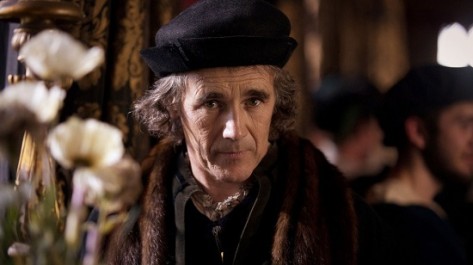Writing at the Catholic Difference, Catholic scholar George Weigel presents a powerful takedown of Hilary Mantel’s prize-winning novel Wolf Hall and the the PBS TV series of the same name, both of which reverse the usual understanding of history in which More is a hero of the faith and Henry VIII advisor Thomas Cromwell is a repugnant, manipulative prig:
Cromwell has long been considered a loathsome character and More a man of singular nobility. In the novel Wolf Hall, however, the More of Robert Bolt’s play is transformed into a heresy-hunting, scrupulous prig, while Cromwell is the sensible, pragmatic man of affairs who gets things done, even if a few heads get cracked (or detached) in the process. All of which is rubbish, as historians with no Catholic interests at stake have made clear. Thus the president of the U.K.’s National Secular Society, historian David Starkey, finds “not a scrap of evidence” for Mantel’s retelling of the More-Cromwell tale; Mantel’s plot, he claimed, was “total fiction.” And as Gregory Wolfe pointed out in a fine essay on Wolf Hall in the Washington Post, historian Simon Schama has written that the documentary evidence he examined “shouted to high heaven that Thomas Cromwell was, in fact, a detestably self-serving, bullying monster who perfected state terror in England, cooked the evidence, and extracted confessions by torture.”
The most important takeaway, in my view, is Weigel’s astute (but by no means unique) observation that the displacement of the Catholic Church in Britain was a matter of raw government power:
Britain’s literary high culture is still in thrall to the Whig view of British history, and seems oblivious to the deep transformation that’s taken place in English Reformation studies since Eamon Duffy’s extraordinary book, The Stripping of the Altars, was first published in 1992. There, Duffy demonstrated beyond cavil what Simon Schama alluded to in his Financial Times article on the BBC version of Wolf Hall: that Henry VIII was a proto-totalitarian who, with his Protestant heirs, imposed his version of Christianity on England against the will of the great majority of plain folk, who stubbornly clung to the old faith until the overwhelming power of the state extinguished most of English Catholic life, and “anti-popery” got set in cultural concrete as modern nation-building went forward in Britain—often funded by expropriated Catholic properties.
Well said, and a lesson well worth remembering as the current-day U.S. government seems bent on relegating Christianity as a whole to caves and remote forests. (If you think that an exaggeration, then you just aren’t well-informed of the situation. Period.)
(I disagree strongly with Weigel’s claim that “anti-Catholicism is the last acceptable bigotry in elite circles in the Anglosphere.” Many, many bigotries are perfectly acceptable and indeed objects of praise and elevated social status in the Anglosphere today, not the least of these being hatred of Jews, Christians who actually believe what the Bible says, Southerners, gun owners, smokers, those who actually understand the science of climate change, and other such benighted individuals.)
(That disagreement notwithstanding,) The full article (very short) is well worth reading.


